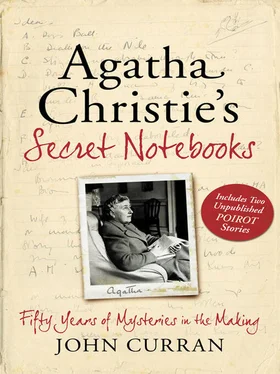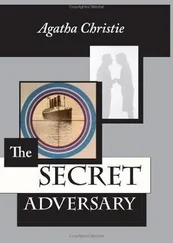‘You refuse?’
‘Absolutely.’
Poirot turned to the girl.
‘And you, Mademoiselle? Do you refuse?’
‘I—No, I would not say I refused. But I do not like the idea.’
‘Well, I do refuse,’ said Graham angrily. ‘Come on, Mollie. We’ve had enough of this charlatan.’
He fumbled for the door. Poirot sprang forward to help him. As he did so a rubber ball fell out of his pocket and bounced on the floor.
‘Ah!’ cried Poirot. ‘The ball!’
He blushed and appeared uncomfortable. I guessed that he had not meant the ball to be seen.
‘Come on, Mollie,’ shouted Graham now in a towering passion.
The girl had retrieved the ball and handed it to Poirot.
‘I did not know that you kept a dog, M. Poirot,’ she said.
‘I do not, Mademoiselle,’ said Poirot.
The girl followed her cousin out of the room. Poirot turned to me.
‘Quick, mon ami,’ he said. ‘Let us visit the companion, the now rich Miss Lawson. I wish to see her before she is in any way put upon her guard.’
‘If it wasn’t for the fact that James Graham knew about the new will, I should be inclined to suspect him of having a hand in this business. He was down that last weekend. However, since he knew that the old lady’s death would not benefit him—well, that puts him out of court.’
‘Since he knew—’ murmured Poirot thoughtfully.
‘Why, yes, he admitted as much,’ I said impatiently.
‘Mademoiselle was quite surprised at his knowing. Strange that he should not tell her at the time. Unfortunate. Yes, unfortunate.’
Exactly what Poirot was getting at I did not quite know, but knew from his tone that there was something. However, soon after, we arrived at Clanroyden Mansions.
vii
Miss Lawson was very much as I had pictured her. A middleaged woman, rather stout, with an eager but somewhat foolish face. Her hair was untidy and she wore pince-nez. Her conversation consisted of gasps and was distinctly spasmodic. ‘So good of you to come,’ she said. ‘Sit here, won’t you? A cushion. Oh! dear, I’m afraid that chair isn’t comfortable. That table’s in your way. We’re just a little crowded here.’ (This was undeniable. There was twice as much furniture in the room as there should have been, and the walls were covered with photographs and pictures.) ‘This flat is really too small. But so central. I’ve always longed to have a little place of my own. But there, I never thought I should. So good of dear Miss Wheeler. Not that I feel at all comfortable about it. No, indeed I don’t. My conscience, M. Poirot. Is it right? I ask myself. And really I don’t know what to say. Sometimes I think that Miss Wheeler meant me to have the money and so it must be all right. And other times—well, flesh and blood is flesh and blood—I feel very badly when I think of Mollie Davidson. Very badly indeed!’
‘And when you think of Mr James Graham?’
Miss Lawson flushed and drew herself up.
‘That is very different. Mr Graham has been very rude—most insulting. I can assure you, M. Poirot—there was no undue influence. I had no idea of anything of the kind. A complete shock to me.’
‘Miss Wheeler did not tell you of her intentions?’
‘No, indeed. A complete shock.’
‘You had not, in any way, found it necessary to—shall we say, open the eyes—of Miss Wheeler in regard to her nephew’s shortcomings?’
‘What an idea, M. Poirot! Certainly not. What put that idea into your head, if I may ask?’
‘Mademoiselle, I have many curious ideas in my head.’
Miss Lawson looked at him uncertainly. Her face, I reflected, was really singularly foolish. The way the mouth hung open for instance. And yet the eyes behind the glasses seemed more intelligent than one would have suspected.
Poirot took something from his pocket.
‘You recognise this, Mademoiselle?’
‘Why, it’s Bob’s ball!’
‘No,’ said Poirot. ‘It is a ball I bought at Woolworth’s.’
‘Well, of course, that’s where Bob’s balls do come from. Dear Bob.’
‘You are fond of him?’
‘Oh! yes, indeed, dear little doggie. He always slept in my room. I’d like to have him in London, but dogs aren’t really happy in town, are they, M. Poirot?’
‘Me, I have seen some very happy ones in the Park,’ returned my friend gravely.
‘Oh! yes, of course, the Park,’ said Miss Lawson vaguely. ‘But it’s very difficult to exercise them properly. He’s much happier with Ellen, I feel sure, at the dear Laburnums. Ah! what a tragedy it all was!’
‘Will you recount to me, Mademoiselle, just what happened on that evening when Miss Wheeler was taken ill?’
‘Nothing out of the usual. At least, oh! of course, we held a séance—with distinct phenomena—distinct phenomena. You will laugh, M. Poirot. I feel you are a sceptic. But oh! the joy of hearing the voices of those who have passed over.’
‘No, I do not laugh,’ said Poirot gently.
He was watching her flushed excited face.
‘You know, it was most curious—really most curious. There was a kind of halo—a luminous haze—all round dear Miss Wheeler’s head. We all saw it distinctly.’
‘A luminous haze?’ said Poirot sharply.
‘Yes. Really most remarkable. In view of what happened, I felt, M. Poirot, that already she was marked, so to speak, for the other world.’
‘Yes,’ said Poirot. ‘I think she was—marked for the other world.’ He added, completely incongruously it seemed to me, ‘Has Dr Lawrence got a keen sense of smell?’
‘Now it’s curious you should say that. “Smell this, doctor,” I said, and held up a great bunch of lilies of the valley to him. And would you believe it, he couldn’t smell a thing. Ever since influenza three years ago, he said. Ah! me—physician, heal thyself is so true, isn’t it?’
Poirot had risen and was prowling round the room. He stopped and stared at a picture on the wall. I joined him.
It was rather an ugly needlework picture done in drab wools, and represented a bulldog sitting on the steps of a house. Below it, in crooked letters, were the words ‘Out all night and no key!’ [18] This picture (it changes to a jar with similar wording in Chapter 8 of the novel) can be seen in Greenway House and may have been part of Christie’s inspiration. She was a dog-lover and lifelong dog-owner.
Poirot drew a deep breath.
‘This picture, it comes from The Laburnums?’
‘Yes. It used to hang over the mantelpiece in the drawingroom. Dear Miss Wheeler did it when she was a girl.’
‘Ah!’ said Poirot. His voice was entirely changed. It held a note that I knew well.
He crossed to Miss Lawson.
‘You remember Bank Holiday? Easter Monday. The night that Miss Wheeler fell down the stairs? Eh bien, the little Bob, he was out that night, was he not? He did not come in.’
‘Why, yes, M. Poirot, however did you know that? Yes, Bob was very naughty. He was let out at nine o’clock as usual, and he never came back. I didn’t tell Miss Wheeler—she would have been anxious. That is to say, I told her the next day, of course. When he was safely back. Five in the morning it was. He came and barked underneath my window and I went down and let him in.’
‘So that was it! Enfin!’ He held out his hand. ‘Goodbye, Mademoiselle. Ah! Just one more little point. Miss Wheeler took digestive tablets after meals always, did she not? What make were they?’
‘Dr Carlton’s After Dinner Tablets. Very efficacious, M. Poirot.’
‘Efficacious! Mon Dieu!’ murmured Poirot, as we left. ‘No, do not question me, Hastings. Not yet. There are still one or two little matters to see to.’
Читать дальше
Конец ознакомительного отрывка
Купить книгу












